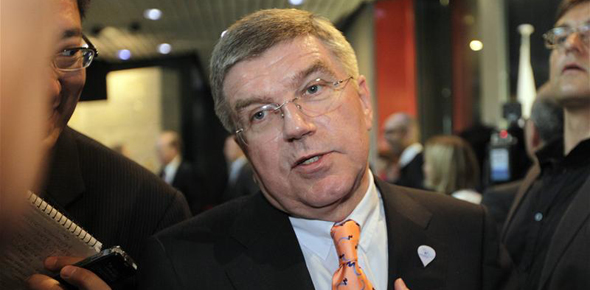Is Thomas Bach the Man to Make the IOC Matter? Keir Radnedge
September 10, 2013
Thomas Bach is favourite to become new president of the International Olympic Committee; he has been favourite since before the retirement-bound Jacques Rogge began his second and last term of office four years ago.
But would Bach be the right choice for the 100-plus members of the IOC as they plunge back into conclave in the Hilton Hotel here tomorrow?
Bach has his critics on home ground where he has been known almost too well for too long. Doubtless as much applies to his five rivals. One issue concerns a years-long shadow cast by a state doping legacy; another concerns his leadership of a German-Arab trade association which has aroused Israeli angst.
However these are not issues to detract from his years of competence within the politics and business of sport. These were all on display in the 125th Session today as he steered members through the law and sport minefield. Rather IOC members might ponder whether Bach’s representation of continuity of style and approach (and region) resembles the Rogge era too closely.
The president to be elected on Tuesday will be only the ninth in the IOC’s 119 years. Seven of the eight thus far have been European. The only exception was the curmudgeonly American Avery Brundage who ruled from 1952 to 1972. Brundage had been Olympic competitor as was Rogge and Bach was a team foil gold-medal winner in 1976.
Financial health
In the past quarter of a decade the Olympic movement has staggered back to rude good health from the death bed represented by the financial cataclysm of Montreal in 1976 and tit-for-tat boycotts of 1980 and 1984. That resurrection has been fuelled financially by shrewd harnessing of the lever of television and sponsorship exclusivity (Football can say as much and even more explosively).
Bach knows all about it. He, just like FIFA president Sepp Blatter, is a sports leadership protege of Horst Dassler, the scion to the Adidas empire who fashioned the commercial sports world of today.
His credentials speak for themselves. The 59-year-old lawyer from the small town of Tauberbischofsheim in Baden-Württemberg is a vice-president of the IOC as well as president of the German Olympic sports federation and a senior administrator at the Court of Arbitration for Sport. He has been a member of the IOC since 1991 and all of his career has directed him towards presidential accession.
Seeking to prevent him becoming the IOC’s first German president are Ukrainian pole vault superstar Sergei Bubka, Puerto Rican banker Richard Carrion, Singapore’s senior IOC vice-president Ser Miang Ng, Swiss international rowing chief Denis Oswald and international boxing boss Ching-kuo Wu (Taiwan).
All six oppose doping and matchfixing. All six endorse improving the (minimal) connection with worldwide youth by more imaginative and creative use of social media.

(Ng represents a serious challenge to Bach)
So where is the choice?
Ng and Carrion are the two serious rivals for Bach. Bubka has been campaigning with more than one eye on beating Lord Seb Coe to the forthcoming vacancy at the head of international athletics. Oswald and Wu are rank outsiders.
Carrion is the financial whiz who has overseen a remarkable vertical rise in the IOC’s financial fortunes. He acknowledges a negative aspect that he has been kept too busy raking in the US TV dollars to effect a horizontal impression across other Olympic themes.
Campaign efforts
This cannot be said for Ng. The sailing supermarket boss has campaigned vigorously far and wide. He is proposing that the president develop a more intimate relationship with the IOC members and international and national federations. Ng would be not just ‘only’ the second non-European to head the IOC but the first Asian.
Ng personifies the nature of the threat to Bach’s ambition.
Rogge has overseen 12 stabilising, enriching years. He has built a solid platform on which the Olympic movement may build. But Bach’s conservatively-managed campaign suggests that he is more about reinforcing the floors and the walls rather than throwing open the doors and windows.
Hard-working. Committed. Worthy. Admirable. But is he the man the IOC needs?
Keir Radnedge has been covering football worldwide for more than 40 years, writing 33 books, from tournament guides to comprehensive encyclopedias, aimed at all ages.
His journalism career included The Daily Mail for 20 years as well as The Guardian and other national newspapers and magazines in the UK and around the world. He is a former editor, and remains a lead columnist, with World Soccer, generally recognised as the premier English language magazine on global football.
In addition to his writing, Keir has been a regular analyst for BBC radio and television, Sky Sports, Sky News, Aljazeera and CNN.
Keir Radnedge’s Twitter: @KeirRadnedge
{jcomments on}


